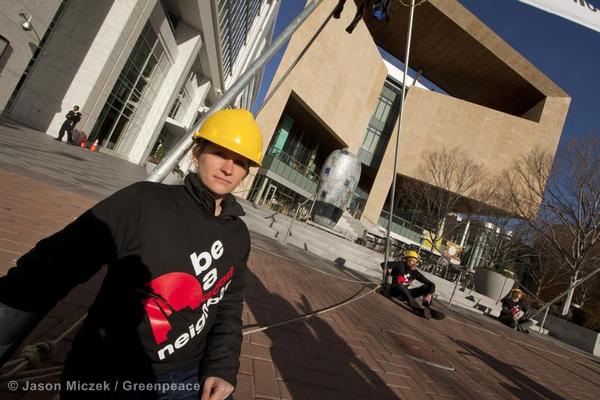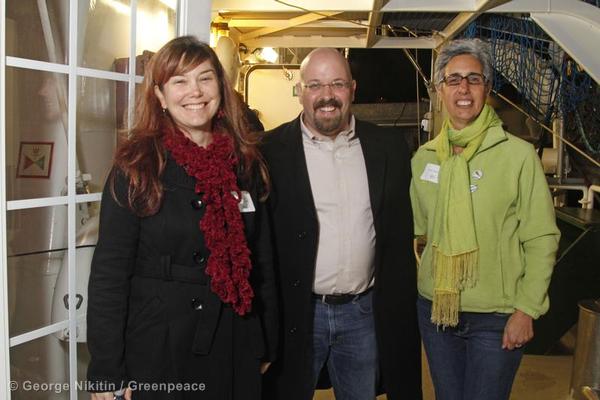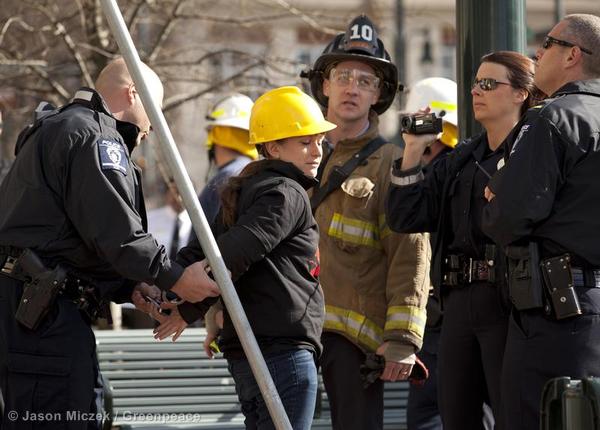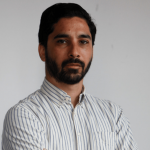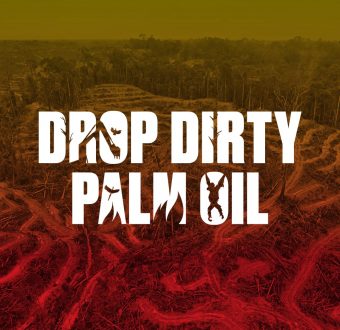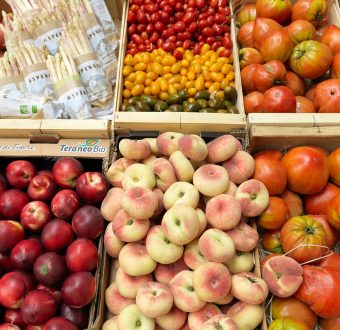From scaling corporate towers and Arctic oil rigs, to big picture strategy and decision-making, to the essential business, executive, and financial operations that make an international organization run, the women of Greenpeace are its heart and soul. For International Womens Day, we thought wed introduce you to some of the women of Greenpeace USA.
Deepa Isac,Deputy General Counsel
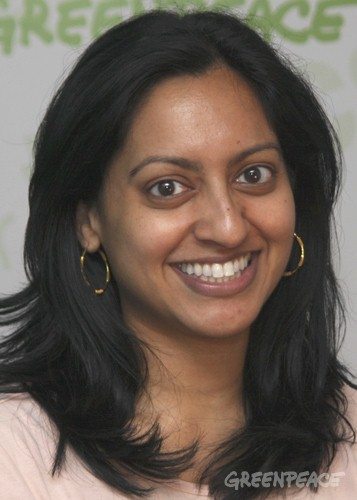 The basis for most of what I do has been about expanding my circles of compassion and empathy. As a lawyer I have always aimed to serve those who are most ignored in our society.
The basis for most of what I do has been about expanding my circles of compassion and empathy. As a lawyer I have always aimed to serve those who are most ignored in our society.
I gravitated toward the environment and criminal defense work. They may seem very different, but they arent. Both are ways of advocating for the disenfranchised in our society. People charged with crimes and the environment are the easiest to ignoreand harm.
I am at heart a criminal defense attorney. Greenpeace was a really natural fit for me because I get to do criminal law for environmental protection. Also, its stimulating for me to be with non-lawyers, to work with people who have a different notion of change than lawyers.
Everything I do here is in support of people who are passionate and have creative ways of making change. Supporting them means I inherently believe in them and in the work that we do here.
There are many layers to marginalization in our society. Being a woman, and a woman of color, have made it easier to see the situation of others who are marginalized. The law is something that belongs to everybody in this countryit is the contract by which we agree to live with each other. It has too often been treated as a mystical and rarefied thing that you cant access unless you study it. Part of what I enjoy about my work is being able to demystify the law and make it available to everyone.
Melissa Thompson, Senior Video Producer
I got my start as a filmmaker through activism. I was living in Louisiana in 1991, when the state outlawed abortion and David Duke almost became the governor. I was very involved in reproductive rights groups and with AIDS groups like Act Up. Nobody had access to professional-grade cameras. When you had a rally or an event, you had to beg people to come cover it. So I took a free class to learn how to use a camera to learn how to shoot our events.
A few years later, I got hit by a car when I was riding my bike and almost died. I was making my films on the side while working at a day job making corporate videos. I thought: what the hell am I doing with my life?
Greenpeace is one of the rare nonprofits that has its own video production capabilities. Most others outsource. Thats largely because Greenpeace has always understood how important visual images are in culture.We put out about 50 videos a year, and the video team shoots and edits the vast majority of them. One of my favorites is the video “You say you want a revolution…”
My feminist leanings creep into the work that I do at Greenpeace. I try to put womens faces on issues, not just as victims, but as people taking serious action against environmental injustice.
And here’s a video by Melissa that features Greenpeace USA’s coal campaigner Kelly Mitchell.
Nicky Davies, Campaigns Director
I was born in the Australian capital of Canberra, which is a city a lot like DC. For that reason, I think that I understood the role of politics in the life of regular people. My father was a research scientist and an expert on the Great Barrier ReefI grew up with a relationship to one of the worlds beautiful places.
Alongside the director of public outreach, I manage the entire campaign program of Greenpeace USA. We build and get implemented the programs necessary to make the changes we want in the world. I oversee the strategic directions of each of the campaigns, but I also oversee the big picture stuff, so that all the campaigns are working in concert.
While winning is not a word that many people in this field are comfortable using, it is what we do and what we want all to be doing.
I feel a huge responsibility to be a role model, both for the organization as a whole, and to the women who work here. Women have and will continue to play a central role in this organization, and I want to do everything I can to make sure that they continue to be leaders here. The most important ground that Im breaking, and maybe this is a bit of a clich, is that Im passionate. I speak my mind more from an emotional place than an intellectual place, and that is truly groundbreaking. That seems very gendered, but I think it means a lot. As Ive gotten older, Ive realized just how much my emotional strength is part of what I bring, and also how much it just is me. I own it.
Amy Moas, Senior Forest Campaigner
 I completed a Ph.D. In environmental science and was teaching at a university. As an academic youre expected to be very unbiased, But that became increasingly hard for me to do given the severity of environmental destruction.
I completed a Ph.D. In environmental science and was teaching at a university. As an academic youre expected to be very unbiased, But that became increasingly hard for me to do given the severity of environmental destruction.
So I started looking for opportunities to do more and was very, very lucky to start looking for a job when this position became available. Campaign positions at Greenpeace dont come around very often.
My work includes our campaigns on the two biggest pulp and paper producers in Indonesia, Asia Pulp and Paper and Asia Pacific Resources International Limited (APRIL). I also work on our Congo Basin palm oil campaign against Herakles Farms.
Some may be surprised to learn that working to protect forests can be largely about the people. In pushing against Herakles in Cameroon for example, our work is really about amplifying the voice of local communities and their resistance.
Charismatic megafauna are important, of course, but forests are also home to people, so we spend a lot of time cooperating with and representing the people whose land is jeopardized by deforestation.
I very vividly remember consciously taking on the responsibility to show that women can be great campaigners at Greenpeace. I am lucky to be surrounded by guys who are both great campaigners and very supportive of my work. I take it seriously and am very proud to pave the way for women to be doing more amazing campaign work at this organization.
Njambi Good, Grassroots Director
I knew I wanted to work for environmental causes and to be part of a broader social justice movement since I was a teenager. I moved to DC after college and worked for a bunch of groupsThe Nature Conservancy, Amnesty International, and most recently for a small regional organization in San Francisco called Save the Bay. It was a managerial position at an incredible organization doing great local work, but I came to Greenpeace because I felt ready to do more national and international scalework.
Im the director of the team that handles grassroots engagement. We work with activists and volunteers and outreach across the country, making sure were able to mobilize and organize to reach ourcampaigngoals.
Our opposition is usually way more well-funded and sits in a more privileged and powerful place that we do. Innovation and cooperating with the broader social and environmental movementas well as local communities provide us with the extra tools that make us more competitive against our opposition. I believe in the power of grassroots and leveraging people power against money. Leveraging innovation to that end allows us to gaintheupper hand.
There are so many women leaders who can be mentors and motivate me here at Greenpeace. Im also so inspired by the women that work on the ground as part of my team. Having people who are so inspiring as your colleagues is everything.
As a leader, I aim to model the kinds of behaviors I want my team to maintain, including striking a work/life balance. I think that may come a lot from the fact that I am a woman, that I want people to not just be great environmental activists but great people who can to sustain themselves.
Monica Embrey, North Carolina Field Organizer
I come from a family of organizersboth of my parents and two of my grandparents were organizers. My biggest hero is definitely my grandmother, Sue Kunitomi Embrey. In WWII she was put in an concentration camp in California. She spent the better half of her life demanding reparations from the US government and won.
I got to be a little girl watching my grandmother demand national attention and getting it, finally ensuring that what was once a dusty, desolate place became a national park.
One of the things I love about being an organizer is that every day is so different. Organizers run everything in this office: were kind of like Janes of all trades.
After the recent Duke Energy coal ash spill it was all hands on deck, full speed ahead, 80+ hours week. It has been incredible to see the massive outcry of everyday people who are so outraged, now that theyve seen the truth of Dukes dirty business plan.Our role in the response has been using our national and local contacts to pull in groups that represent the people of NC but who arent normally associated with traditional environmental issues.
In February 2012, 6 other North Carolinians and I were arrested in front of Duke HQ, where we were protesting Dukes trying to raise rates for coal plants. Duke was trying to hike rates by 20%. We were able to get reduced to 7.2%. In the end we still didnt like that, for reasons of equity, but also because its just wrong to pay to maintain a dirty source of energy.
Molly Dorozenski, Media Director
 Im a writer and went to grad school to write poetry. I used to co-curate a reading series in New York, and I have worked as an editor for a few literary magazines. After grad school, I worked in various capacities in the publishing industry, including as a publicist for a big literary house. It was then when a canvasser approached me on the street and signed me up as a member. Had it not been for the canvassing program, I wouldnt be here.
Im a writer and went to grad school to write poetry. I used to co-curate a reading series in New York, and I have worked as an editor for a few literary magazines. After grad school, I worked in various capacities in the publishing industry, including as a publicist for a big literary house. It was then when a canvasser approached me on the street and signed me up as a member. Had it not been for the canvassing program, I wouldnt be here.
Having not been in the environmental community all my life, I can step out of it and think about what it looks like from the outside.
When we do our communications work I want to reach out to people who dont consider themselves activists but still care about these issues.
After the BP oil spill, I spent a few months in the Gulf of Mexico. BP was blocking journalists from getting to the really bad spots, but because we have boats, it became clear what our role could be down there. We didnt need to influence the story at all. We just needed to let people see for themselves what was already there.
About a year and a half ago, I was diagnosed with multiple myeloma, which involved a year of chemo, followed by more treatments. In that kind of situation, you ask yourself if youre on the right track in your life. When the shock wore off, I realized that I wanted to continue to put as much of myself as possible into the work we do at Greenpeace.
Everybody supported me with my crazy chemo schedule, but also they didnt hold back. We care a lot about each other here at Greenpeace, as a community, and we also care about getting the job done. That time deepened my relationships with the people I work with and to my work itself. There are very few things Id rather be doing with my time than the work I do here.
To hear from even more of the rockstar women of Greenpeace USA, check out this radio spot from KPFA, featuring GP USA’sLeila Deen, Hettie Geenen, and Laila Williams.
(This post was originally set to run on March 8, 2014 for International Women’s Day, but server trouble delayed it. Of course it requires no special occasion.)
